Shahin Dreams to be an Ideal Teacher

Shahin Mia, a 11-year old boy, lives at the Bara Kanda village under Chander Kandi union of Raipura upazila in Narsingdi district. He is a child of special needs faced with a unique obstacle from birth - he could not walk like other children due to leg impairment.
Recognizing the importance of education, Shahin's parents enrolled him in the nearby Bara Kanda Para Government Primary School when he was just in Grade II. However, the outbreak of the COVID-19 pandemic in 2020 disrupted his education, forcing him to return home. The closure of schools and the cognitive dissonance related to remote learning left Shahin unable to resume his studies.
In June 2022, UNICEF, along with other development organizations, initiated a plan to establish community learning centers for the disadvantaged children across Bangladesh. Narsingdi became one of the focus areas for these initiatives. Through community surveys, the EMDC project staff learned about Shahin's break in education and his unique needs. When the EMDC project established the "Cholo Anande Shikhi" Learning Center, Shahin's mother Ranu Begum without delay provided her child's basic information to the project staff, and Shahin found a new educational home.
Through consistent efforts and the unwavering support of his teacher, Shahin made remarkable progress. He learned to write sentences and read lessons, defying the odds that life had presented him. Shahin's dream shines bright amidst all these challenges. He aspires to become an ideal teacher in the future, inspired by the teachers who guided him through his unique learning journey. As Shahin continues to overcome obstacles, the learning center stands as a symbol of hope and inclusivity, ensuring that every child, regardless of their circumstances, can dream and aspire to reach new heights.
Expressing gratitude, Shahin's mother, Ranu Begum thanked UNICEF, VERC and especially Shahin's teachers for the unwavering support that had propelled her son towards a brighter future.
Barkat Dreams to be a Businessman

Barkat Ullah is a boy of 11 (Eleven) years who lives in a poverty-stricken family in Baniadi village under Mahishashura union of the Narsingdi sadar upazila. Despite the difficulties his family encountered with, Barkat had a dream becoming a businessman. However, he faced many obstacles in pursuing his dream. Barkat's father, Asgor Ali, abandoned his family when Barkat was just a few days old. His mother, Kulsum Begum, had to work in a spinning mill to support their family. Barkat had to stay with his grandmother while his mother was at work. When he turned 08 (Eight), his family struggled to afford the basic necessities, and Barkat had to start working in the spinning mill.
Eventually, Barkat's elder brother, Rahomot, helped him getting a job at a grocery shop. However, Barkat had no education, hence found difficulties in calculating the prices of goods. The shop owner suggested that Barkat goes to a nearby government primary school, but the timing was conflicting with his job. Fortunately, UNICEF and VERC started an alternative learning center near to Barkat's community. His mother took him to the learning center, where he was admitted at the age of 11 (Eleven), having never been enrolled to any school before. The teacher, Shamima Yeasmin, conducted a diagnostic assessment and enrolled Barkat in the Cholo Anonde Shikhi Kendro. Barkat attends the learning center regularly, keeping balance with his job at the grocery shop in the morning and learning basic literacy and numeracy in the afternoon. He is determined to learn math so he can calculate prices and handle purchase and sales-related tasks at the shop. As Barkat continues to attend the learning center, he begins to excel his studies. He quickly caught up with his classmates, and his teacher noticed his aptitude for math. His teacher encouraged him to continue pursuing his dreams and reminded him that education is the key to a better future.
Barkat's mother is grateful to UNICEF and VERC for helping her son. Barkat himself is enthusiastic about his education and determined to become a renowned businessman after completing studies. Barkat's story is a testament to the transformative power of education, even in the face of poverty and adversity. With the help UNICEF and the dedicated learning center teacher like Shamima Yeasmin, children like Barkat can pursue their dreams and think for a better future for themselves and their families.
Barkat's story is an inspiration to other children around his community who are facing similar type of challenges. It shows that with hard work, dedication and the right support, anything is possible. Barkat is now pursuing his dream of becoming a successful tradesman, and he aspires to use his success to help other children like him to achieve their dreams.
ODF Community Follow

Shahana Akter, a resident of the Choto Moheshkhali union in Cox's Bazar district, is the President of a WASH Committee formed under the DEVCO-II WASH Project. Her husband, Md. Siraj Kamal, is a meat seller and they have three children who are attending school. The community initially faced poor WASH conditions, with a lack of hygienic latrines, hand-washing devices and proper hygiene practices.
Shahana Akter realized that to inspire change, she required to lead by example. She installed a latrine at her own home and started her efforts to improve the community's WASH situation. Despite facing initial challenges in motivating others to install or repair latrines, Shahana's determination did not fade away.
Meanwhile, VERC conducted courtyard sessions in the community after the Community-led Sanitation Assessment (CSA). Shahana attended those meetings and motivated others, creating a demand for latrine installation and repairing. With her unwavering confidence, she strived to declare her community 100% open defecation-free (ODF).
Shahana's hard work became a success, and within a month, 86 latrines were installed under her guidance and assistance. On the 1st of September 2022, the WASH Committee declared the community as ODF, which was later on verified and certified by the Ward WATSAN Committee on the 22nd of September 2022.
Currently, the community has 102 hygienic latrines and all households have hand-washing devices. Shahana and the committee members are continuing regular follow-up to ensure the community's sustained progress. Shahana acknowledges the technical support provided by VERC and expresses gratitude to both VERC and UNICEF on behalf of the community. She emphasizes on the need for personal change before advising others, and stresses upon on the importance of sustaining achievements after withdrawal of external supports.
Selina Begum's Story of Being Healthy

Saharbil is a village in Saharbil union of Chakaria upazila under Cox's Bazar district. A community of this village is Moktar Ahmed Master Para. Since 2019, VERC has been implementing UNICEF-funded GoB-UNICEF WASH program to improve the safe water, sanitation and hygiene situation.
Following that, the water, sanitation and hygiene conditions of the community were analyzed with the participation of the community people. There are 79 families in the Moktar Ahmed Master community. A picture of water, sanitation and hygiene in the area during the Community Situation Analysis (CSA) shows that around 75% households have unhygienic latrines and there was no hand washing device.
Selina Begum (65) lives in this community. Her husband, Zafar Alam, died from liver jaundice around 25 years ago. She could not do treatment of her husband properly due to lack of money. Selina Begum has 03 (Three) daughters. She gave her daughters marriage with the help from others. She has a grandson (12 years) who works as a carpenter. She runs her family by working in other people's houses, and also depends on widow's allowance and the help from her community people. Selina Begum mentioned that there was a time when she used to suffer from various diseases like stomach pain, diarrhea and dysentery, and therefore always had to go to the doctors. Due to lack of money, it was not possible for her sometimes to buy medicines. Illnesses often persisted. Even after that, around Tk. 3,000 to 4,000 were spent on doctors and medicines a year. For this, she had to face various problems.
A WASH Development Committee was formed to implement the WASH program in the Moktar Ahmed Master para community through VERC. Selina Begum was selected as one of the members of the committee. She participated in the Water Safety Plan (WSP) Orientation, Health Education Session and WASH Development Committee Meeting. Through these, she learned about safe water, hygienic latrines and hygiene practices. Open or unhygienic latrines cause diarrhea, dysentery and other germs. She got the realization why she had so many diseases and what were the reasons behind them. She learned that open and unhygienic latrines spread water and fecal-borne diseases and pollute the environment.
The latrine used by Selina Begum along with her kitchen was unsanitary and infested with flies. She realized that unhygienic latrines lead to environmental pollution. The latrine at her home was made sanitary with the help and advice from the volunteers of VERC. A low-cost hand washing device has been established for hand washing. Now, Selina Begum regularly uses hygienic latrine and washes her hands with soap at regular intervals. The frequency of her illness is less nowadays.
It is not a matter of lack or poverty; it is possible to stay healthy if there is willingness and proper awareness. Selina Begum is now leading a healthy living.
Munni moving towards a better life
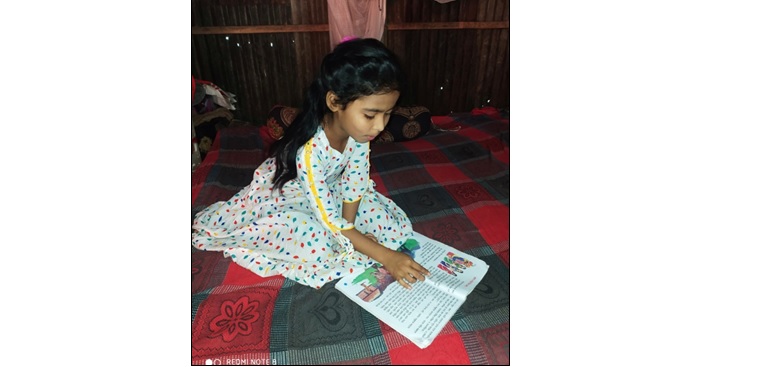
Fatema Aktar Munni hails from Naogaon village of Tongi in Gazipur City Corporation. She is nine years old and a student of class three at the Naogaon government primary school. Poverty has been ingrained in their lives from the very beginning. Munni’s mother Kamrun Nahar is a housewife and her father collects and sells waste materials. Munni is a lively, agile and vivid girl since her childhood and a talented student in her school. Her parents maintained their family very well with their limited income and they lead a happy life. Munni says she wants to be a doctor when she grows up and will treat poor and miserable people for free.
But on a sudden outbreak of the deadly epidemic Covid 19 spread around the world; all activities came to a standstill due to lockdown. At the same time the studies of the children are under extreme threat as the education institutions have been closed for a long time. COVID-19 has put her education in crisis. She has engaged herself in unproductive activities due to lockdown. A significant portion of her time is spent in gossiping, playing ludu and online games and watching television. She has no attention to study and falls on irreparable damage. Munni’s parents are very worried about their daughter’s backwardness in studies. They think the girl’s dream of becoming a doctor will be shattered and may stop their daughter’s education.
At this juncture in the country, the Save the Children and VERC’s DRESSMANN Education Project conducted various activities to keep the children studying at home during school closures, distributed education materials to keep the children mentally happy and to bring them back to school safely. One day Munni’s father gets a message from the DRESSMANN education project. The Education Field Facilitators are providing mobile messages, phone calls, sessions and motivational household visits in keeping the GPS children in the learning process and engage them in ‘Sangsad TV and Bangladesh Betar’ broadcasting classes and also motivated them to follow the daily study routine to minimize the learning gaps created for the prolonged closure due to Covid 19 pandemic.
Munni with the help of the Education Field Facilitator understands her learning gaps created because of school closing for round the year. She realized that there is no way to recover the study gap completely without attending the broadcasting ‘Sangshad TV’ classes regularly. The project staff supported her to minimize the learning gaps by following the daily study plan and making her self-motivated to get engaged in studies that she used to follow while her school was opened. Now she studies regularly at home and adheres to hygiene to stay safe from the Corona virus infection. She has been continuing education at home with the help of her mother.
She is now leading a life of hopes. She is going ahead with her studies each day. She gets up very early in the morning every day. She starts her studies from 7 AM and continues up to 10 AM and then again from 6 PM to 9 PM every day. Now, she does not want to miss the TV classes which are aired on Sangshad TV at 3.05 o’clock; she watches and practices it later. “After knowing about the severity of COVID19, my family and I are trying to be careful. It has been more than 15 months that the school is closed. I want to return to my school”- says Fatema Aktar Munni.
Munni said, “I stopped my study before the VERC Apa visited our house and discussed the importance of study during the shutdown of school; my attitude towards study has got changed gradually with the interventions of the DRESSMANN project started here.”
Role of an Imam in promoting WASH activities
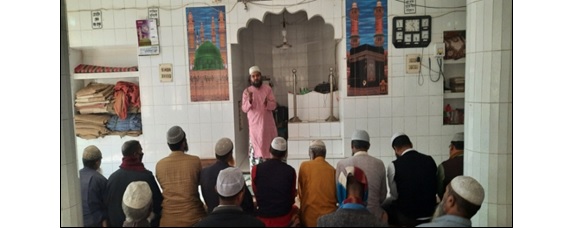
Imam Md. Moniruzzaman hails from Char Mohanpur dakkhin para village Ward No 8 in Mohanpur Union under Ullapara Upazila. He is 45 years old. After completion of Islamic education he started tailoring profession alongside the role of imam at Char Mohanpur central mosque since 1993. In his childhood he wanted to do something for the well-being of the Muslim community; for this he was looking for a platform. During the time of CSA conduction he was selected as a CWAC Committee Secretary in his community. He received different types of WASH related training and orientations from the project and started the WASH activities at his Char Mohanpur Dakkhinpara community for improving the WASH situation. At the same time he stimulated the other CWAC Committee members to do work for the sake of improving the WASH situation improvement within their para.
Bangladesh has a Muslim majority and the character of the country is strongly marked by Islam. In rural areas, where the majority of the population resides, religious leaders or imams are considered as opinion makers. So SAWRP II decided to involve religious leaders/Imams at the time of BCD approach launched in the project in order to promote long-lasting, positive changes in attitudes and behavior related to WASH practices. From this point of view, VERC invited Imam Md. Moniruzzaman to take the role of delivering sermons (Khutba) about WASH and hygiene at the Char Mohanpur central mosque in presence of the Muslims during the Jummah prayer (weekly prayer on Fridays). He took this offer cordially and engaged himself to deliver sermons on every weekly Friday prayer.
“I was very satisfied with the training and orientations on WASH from VERC. I was not expecting this because before coming, I thought that there was nothing I could learn that I haven’t known before. When I was selected to represent my Khutba, I was skeptical about coming. But, the training about water and health touched me deeply and I have learned new facts and ideas that I can use in Khutba. I have now been teaching about water and health in Friday prayer for an entire year. Thanks to VERC training staff who can live longer now in Ullapara.” said Imam Md. Moniruzzaman.
Moreover, he mentioned the well-being and best interests of the community laying emphasis on working together. When any Imam takes the lead and talks about hygiene and sanitation, the people, at least the congregation, will listen to him. I’ve seen many behavior changes being much faster and more sustainable since religious leaders have been involved. Imam Md. Moniruzzaman delivers his sermons with messages on hygiene and hand-washing in his congregation of almost 150 times in the Jummah prayers at the Char Mohanpur central and other mosques still now.
Now there is significantly low-cost of medicine compared to previous ratio, Abdul Mozid is repaying the loan installment with that money.
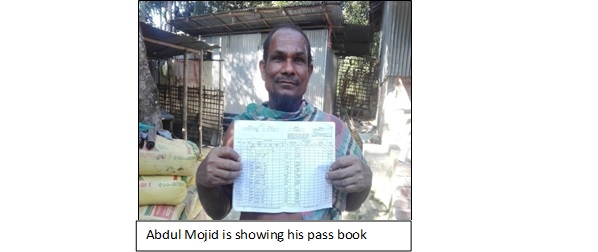
Food is needed to survive. Similarly, a healthy environment is necessary for healthy living. Healthy environment means at least a hygienic latrine, safe water and the practice of hygiene. In our less developed country, many people have the idea that hygienic latrine, safe water and the practice of hygiene are only for the rich, because the poor don't have the money to do these things. But this idea was proved wrong by Abdul Mozid of Dinamaster Para under Sadar Union of Rajarhat Upazila under Kurigram district.
From the beginning of the South Asia WASH Result Project - II, the PRA tools have been exercised in this community. According to the social map, they had no hygienic latrine, no hand washing device and no tube well with platform; they had been using an unhygienic latrine. He had no idea on hygienic latrine and critical times of hand washing. VERC started courtyard session after the baseline information had been collected at this spot. His wife Saleha Begum, is an active participant in the courtyard session. The first session had discussion on hygienic latrine use and the second session discussed on the importance of hand washing. After the session, his wife could understand that they need to have a hygienic latrine and a hand washing device. She discussed with her husband about the latrine & HW device. Her husband also agreed to convert their unhygienic latrine into a hygienic one with the technical support of VERC. They repaired the latrine at a low cost. After some days they installed a hand washing device made of drum with tap. That's how they used it for one year and when they got the benefits well; they realized the importance of using it and decided to install improved latrines. But they were worried because of how would they manage the needed amount of money for the purpose. VERC staff Khadija Begum listened to their situation and advised them to take a loan from Grameen Bank. Having the loan they installed an offset latrine with a ceramic pan. They are feeling very comfortable now by using that latrine. Earlier, he had also renovated his tube well platform.
At present, Abdul Mozid’s family has a hygienic latrine, a tube well with platform and a hand-washing device. In a word, his family is now leading a healthy life and his family is the best family in the neighborhood.
When asked about the feelings, Abdul Mozid said, “By the grace of Almighty, I am very fine, I am healthy. Everyone in my family is now living well. I have built a latrine with loan money. I have also repaid that loan. I have taken a loan again to build a house. Now I can repay the loan installments with the money which was supposed to be used for buying medicine earlier.’’ Finally, Abdul Mozid thanked VERC for guiding him wisely in right time.
“Disable Yasmin and her painful story”
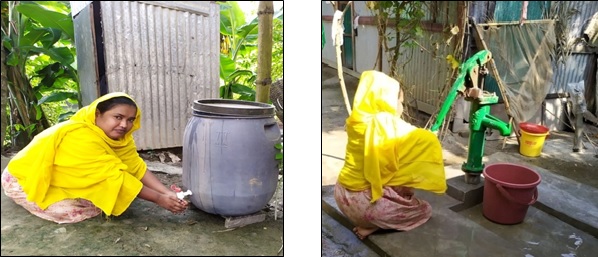
Yasmin (30) was born in a poor family in Jinglatali village of Daudkandi Upazila of Cumilla district. They are 6 members in the family including parents, one brother and three sisters. Father Md. Abul Kashem is a Day labourer mother Khatija Begum is a housewife. Two of her younger sisters are married and the brother is married and lives as a separate family. Yasmin Akhter is staying with her parents as she is not married due to her disability.
Yasmin Akhter, the first child of the parents, is physically handicapped by birth. It is very difficult for her to move and walk. There is no cultivable land of the family other than the house. Her father's meager income is very poor to maintain the family. Since her family did not have any tube-well, her mother had to collect drinking water from a long distance, which was contaminated with arsenic, they had to take bath with dirty water and used unhygienic latrine, which caused diseases round the year.
Unicef - supported WASH project was started in 2019 and an Environmental Development Committee was formed to analyze the overall situation of water and sanitation in Jinglatali South Para. Through monthly meetings, plans and decisions were taken to solve the problem by discussing issues including safe water, sanitation in improving the environment of the area. In addition, VERC staff discussed in courtyard meetings in each home - open toilets and unhygienic latrines, how feces get into people's stomachs, harmful effects of arsenic-contaminated water, the benefits of safe water, and the process of getting arsenic-free tube wells through various sessions and posters. Yasmin, who is a disable, told her father first of all to clean the family latrine and to build a low-cost hand washing device to wash hands with soap. As a result, everyone in the family now can wash hands regularly with soap before meals and after using the latrine. When Yasmin learns that an arsenic-free deep tube well has been installed in collaboration with Unicef, she tells her father and appeals to the Union Chairman on behalf of the other families in the house. A deep tube well was installed in 2020 in response to the application.
Yasmin is free from worries now; her mother no longer has to fetch water from the tube located far off. Since there is a tube well in her house, she can help her mother by collecting water by scattering her legs and she can take a bath by pressing the tube well. In addition, about 20 families in the area collecting and using water from these tube wells for washing food and cooking. At one point, tears rolled down from Yasmin's eyes while she was talking about the troubles of the water and the latrine. Yasmin said she is grateful to VERC and UNICEF for the support bringing changes in health practices, including improved sanitation and safe water, and hoped for more support in future.
Sonabhan Initiated Platform System Poultry Farming
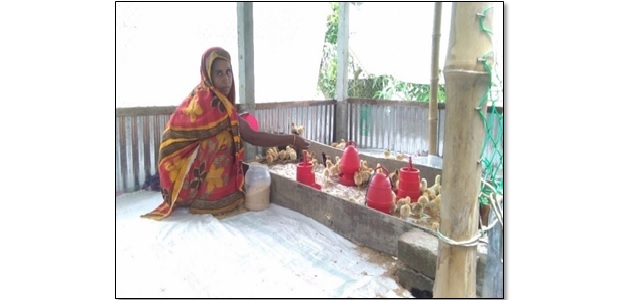
It is often difficult to work restoring peoples’ success. Such success has made true in one women’s life named Sonabhan through flood resilience platform system poultry rearing. She is the wife of Mosarof Sikder aged 40 living beside the Arial Khan river in Charbalaishar village of Dheukhali union under the Sadarpur Upazila in Faridpur district. She has two sons and a daughter; among them elder son is working in Dhaka, younger son studying in class seven and the daughter studies in class ten. She has engaged herself with agricultural activities with the support of her husband as he is selling spicy puffed rice as a hawker in Dhaka City. Due to Covid-19 pandemic school and collages remained closed and he lost income scope in Dhaka, and returned home. She inspired her husband and took land on lease for cultivation. Besides this, she told her husband that she is an active VERC organized group. She participated in group meetings, court yard sessions, etc. and became aware on flood preparedness activities for minimizing loss and damage during floods.
Besides agricultural works, Sonabhan received training on platform system poultry rearing and prepared a platform system poultry shade with technical assistance from Zurich Flood Resilience Project at a cost of BDT 17,400; while the project supported in cash BDT 8,955 and the family of Shonabhan contributed the remaining BDT 8,445 in cash and kind.
Previous experience of financial loss due to death of poultry as much as high has inspired the family to invest such an amount in advance (before flood) so as to increase flood resilience. As a result, she could highly reduce loss of poultry including other valuable assets during the Flood - 2020. Having good flood resilience experience of 2020, her family decided to extend farming and bought 100 poultry birds, gave vaccines and fed regularly and stored agricultural items in proper places. Her monthly income presently stands at BDT. 9,000/-. She practices flood preparedness activities like savings, storage of dry food, fire woods etc. She expressed, “Now I’m happy as being adapted with flood affects recently which has been made possible by investing for flood resilience. And expecting more flood resilience technologies which would accelerates knowledge and skills for building flood resilient, happy and prosperous communities”.
Ziasmin Banu made a very good earning from platform system goat rearing
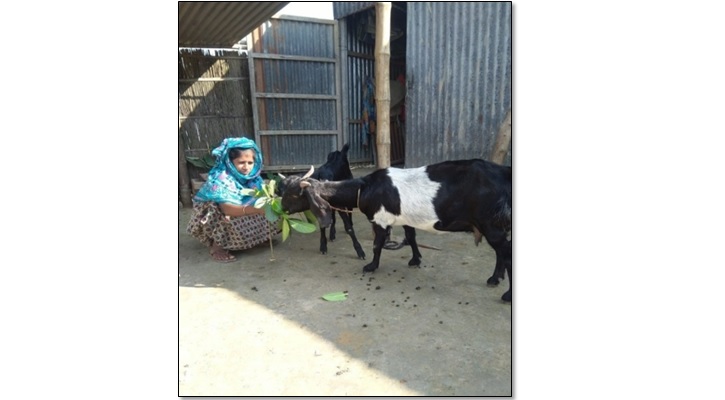
Ziasmin Banu is a daughter of Adeluddin Khan & Shonabhan, living in the Yusuf Alirdangi Village of the North Channel Union. Due to poverty her study was stopped at an early stage of life and she got married in 2000 with Shoujo Sheik of the same village. They have one son and one daughter. Her husband is a day labour and once he severely suffered from intestinal ulcer that collapsed the earning capacity of her husband. In such a crisis moment she decided to sell a cow and three goats and formed a capital amount of Tk.50,000 which they had to spend for her husband's treatment that was of some help in that situation but still better treatment was required. For total recovery from the disease, she had to sell some more assets to manage additional Tk. 50,000 and after that availing further treatment in Dhaka he got fully cured and could start working again.
In such a situation with the help of local people, she started sewing clothes and rearing some cow and goats on sharing basis. Through joint struggle and efforts, she could save more money for a better future and they could buy 10 acres of land instead of taking land on lease. She shifted to a new house and started to increase rearing of livestock and poultry. In 2019, she received training on goat rearing under ZFR project and with VERC support got the platform system goat shade. Group meetings and courtyard sessions opened her eyes to know the ways and means of being prepared for flood resilience before onset of flood and could realize the importance and benefits as they had bitter experience of flood affects which was a challenge of every year as they live beside the Padma River. In 2020, she became well aware regarding flood preparedness and raising plinth, plantation of Banana surrounding their homestead so that floods cannot wash away soil which increase risks of landslide. Moreover, the raised platform system goat shade saved lot of assets during the flood of 2020 as flood water could not submerge their house and premises. In the last Eid-Ul-Azha (Kurbani) she could sell three goats and earned Tk.23,000 which especially helped her to repay the loan that was spent for her husband's treatment. Now, both husband and wife are happy and passing days much better with their children as they need not to pay for the land any more hired for use as space for living. She intends to educate her children. Beyond their happiness they have fear as they are living beside the river Padma which causes erosion to the embankment every year. She told that the river embankment and flood resilience raised community road could be helpful and sustainable for hundreds of people living here years after year only with meaningful government initiatives.
Minu Hasda- a sparkling example of integrated community support
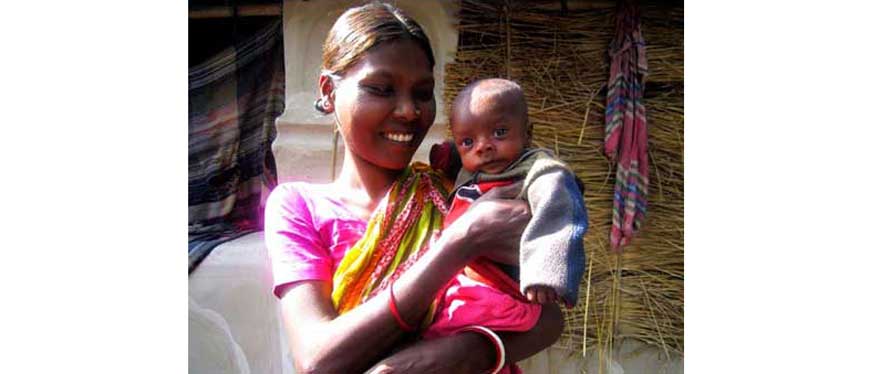
It is true that as a result of the traditional development approach, poor, village people, minor ethnic group as well as women are always deprived of all types of opportunities and rights due to marginalized status in society. In that sense, Minu Hasda is the poorest of the poor women of the ethnic minority. She lives with her day lobor husband Paolus Tudu in Bazarpur village of Amarpur union in Chirirbandar upazila in the northern poverty stricken area in Bangladesh. Her family is of a hand to mouth economic status. Sometimes they pass days without taking any meal for lack of any income due to unemployment. They have a two years daughter.
The family maintains superstitions like children are the gift of god and nothing to do against it, herbal treatment is better than modern day medical treatment, additional food and regular check up are unnecessary during the pregnancy period. So they do not use any family planning method, as a result Minu Hasda became pregnant one after another. She did all of the household works during the danger situation and she did not take any essential dietary supplementation at that stage even she did not take any health check up. As a result, her health situation deteriorated quickly and an abortion took place after six months. But she became pregnant again after two months.
She took various traditional method and herbal medicine from village doctor under pressure of her husband and family. As a result, she turned to a case of severe anemia. In that situation, Ayasha Khatun, a paramedic of ERHSA project observed her for the first time and took Minus Hasda to Burihat Community Clinic (CC) for check up and then involved the PNGO (UDDOG), HWC, and Union Parishad for necessary support. After checked up, she was referred to Chirirbandar Upazila Health Complex. It is to be mentioned here that when she was passing 28 (twenty eight) weeks, she was in a danger situation due to severe anemia and they referred her to Dinajpur Medical College and Hospital for better treatment. Blood was her crying need. UDDOG staffs, Harun ar Rashid - a HWC member and Md Shahidul Islam, Secretary of Amarpur UP donated 4 bags of blood for her purpose.
Doctor Munni Begum of Dinajpur Medical College considered caesarian operation as a must for the wellbeing of mother and child safety within seven days. Her health situation improved after completion of all preparations. She gave birth to a male child of 2 kg weight all on a sudden on 18.11.2012. Mother and the neonate returned home after 16 days with a smiling face and fulfillment of satisfaction. She is committed to immunize her baby properly. She and her husband thanked a lot to HWC, Amarpur UP Chairmen Liakat Ali Sah, Uddog and VERC for standing beside her in the critical situation. She also told that it was really impossible on her as well as her baby’s part to survive in absence of heartiest cooperation of all around.
Community Participation Activates UP Standing Committee
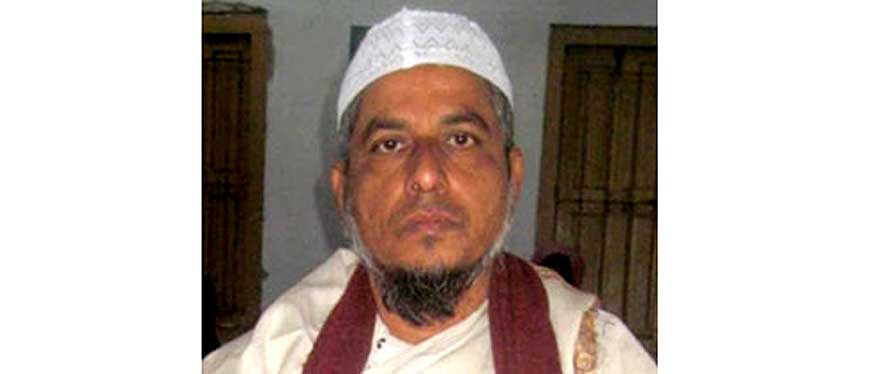
“As an Imam of the mosque, I use to deliver religious messages to the Muslims during prayer, especially on the Jumma day (Friday). Bedsides playing the role of Imam, I am also the member of Union Education, Health and Family Planning Standing Committee of Baghuatia UP of Abhaynagar Upazila” said Mr. Afzal Hossain. As an elderly person most people listen to me and follow my suggestions. I have received health messages from the primary health care training organized by VERC and BKF. Then I started to deliver health messages to motivate community people to attain services from the government health service points. My reputation helped me to mobilize the community people at mosques, academic institutions, social and religious functions, etc.
During Khutba, the speech of the Imam, I generally talked about antenatal care and postnatal care (ANC and PNC services), importance of regular immunization (through EPI), breast feeding counseling, management of diarrhoea and malnutrition, distribution of Vitamin A capsule, identification and treatment of anemia in women and its relations with prayer citing verses from the holy Quran. After participation in the orientation sessions I included the issues of antenatal care and postnatal care (ANC and PNC services), regular immunization (through EPI), breast feeding and its impact on health and household economy more systematically.
He added, “My realization has been changed on antenatal care and postnatal care after getting messages in this regard through participation in a discussion session on health programme. It opened my eyes to correlate these messages to social issues. From that realization I am still continuing delivering those messages for the sake of the community people”.
The Imam said, “It was a superstition among people that ‘Anemia’, ‘Infant mortality ’, etc, are considered as ‘Bala mochibat’ as consequences of evil act of people. When the incidences of evil act increase God sends these diseases. Accordingly, it is also the symbolic message to people for remembering God more frequently and to remain away form evil tasks.
He also stated that some people called the Fokir (Spiritual leader) to help prevent the village from Bala mochhibat. Then the Fokir was given money for his work. “From my realization, I used to advice people to take proper treatment, get ANC and PNC checkup at their nearest health service center and maintain hygienic life to keep away all the Bala mochibats”, he said.
He said, “After receiving hygiene message, the community people became aware about the causes of health hazard and they have become used to get to the service points in times of need. The incidence of complication related disease of pregnant mothers has reduced substantially in the community. Despite increase of knowledge I am continuing to deliver messages for the sake of sustainability of the achievements. At present, I am regularly monitoring and visiting the communities to assess the status of use and sustenance of achievement of health service center”, he said.
Several times I emphasized on establishing a mechanism that would ensure participation of the respective community people which will lead people to sustain the achievement. As an Imam I will continue to give messages to people till Allah continues to bless me with that opportunity’, said Mr. Afzal Hossain.
His dreams that one day he will be able to establish a religious forum to share the knowledge of community people to address the health problems and remove them forever.
Now Shahin is dreaming of establishing his own workshop
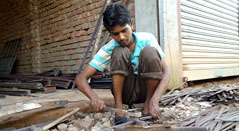
Shahin Hossain, son of Md. Amir Hossain and Mrs. Rabeya Begum, a 17 years boy working in a grill workshop. His father is a day labour and mother is a house wife. Shahin is the elder son of his family, he has two younger brothers one of them is disable. He has been working here for the last three years. Shahin and his family migrated from Barishal to Savar due to poverty. Shahin loved to go to school from his childhood, his father admitted him to a Madrasa but his father’s illness forced their family to migrate and he was the only hope to work and earn for the family. Shahin did not like to work in the beginning because it was a very hard work i.e. he had to carry heavy rod, iron, cut them and furnish them by hammering and the work started from 8.00 am and continued to 10.00 pm.
However, the main problem was that he had to serve three years without any payment, employer provided him only one time food. After 3 years he was provided with Tk.1500/- per month as salary. In the year 2013, he admitted himself at Mozidpur VERC School in class 01. During last year Shahin received vocational training on welding and developed his skills. To see his expertise the employer increased his salary from Tk.1500- to Tk.5000. With a sparking smile Shahin was speaking that my employer got huge change i.e. previously he slapped, used slang for scolding. He thinks that motivational activities have made this change.
In the beginning he was taking Shahin education as a burden but watching the changes of Shahin, employer is very happy now. The project has provided first aid box to the workshop during 2013. Still now the box is functioning well and necessary medicine support is being provided by the employer. Now Shahin’s dream is to work hard and establish his own workshop.
Ratna and her dream
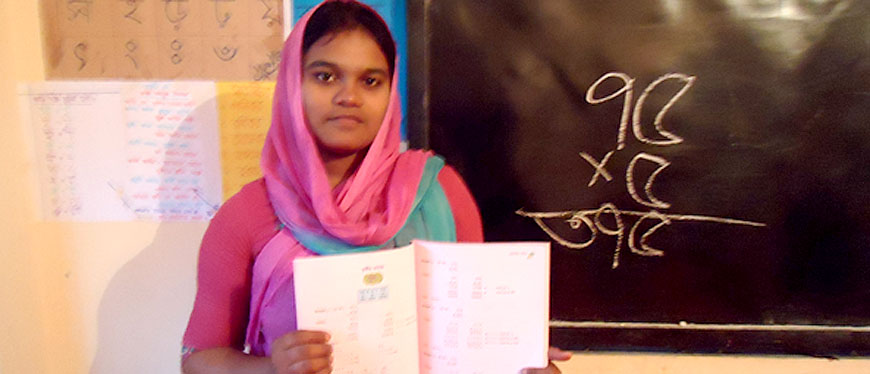
A 13 year old girl Ratna Akter is student of class two at Talbug VERC School, Savar. She came from a tiny village Tarabari under Pabna district. Her father Majid Ali is a hawker and mother Banesa Begam is a house wife. She has 2 brothers and 3 sisters. They were living in their village together. It was difficult for her father to manage all expenditure of the family. Under this circumstance her father sent Ratna to Savar as domestic worker and since then she has been working in a house as house maid. One day Ratna heard about a school where domestic workers’ can enroll easily and she also informed that the school is close to her work station. Due to her interest the teacher talked with Ratna’s employer. They also agreed to Ratna’s enrollment as a student of the school. Then she started her education. She comes to school regularly after finishing her work.
Before attending the school she could not talk nicely and make herself free with others. But now she has some positive changes and can nicely speak about anything as well as can read and write. Ratna has many friends in her school and they share their emotions with each other. Ratna’s employer is satisfied with her work and they gave a gold earring to Ratna.
She knows about the disadvantages of early marriage from life skill classes. Resulting that when her father arranged her marriage she disagreed confidently, not only that she shared with her family about her dreams. Ratna wants to be a teacher and teach those children who have no educational opportunity.
Mosque committee extended cooperation for establish school house.
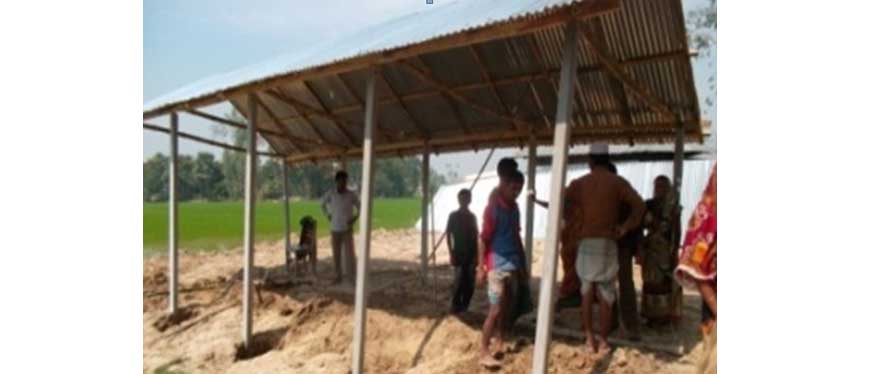
Village name is Jamtail Kanadigi where is no any primary school , majority of illiterate and conduct their family through selling their labor, children do not go to school in nearest village due to distance. It is stand on Dhamaynagar union under Raiganj Upazila, district Sirajganj. Villagers came to know that VERC is going to establishing non-formal primary school for dropout and departing children from school. Villagers decided that they will established one school for their children but nobody are capable to provide a house for school, then they selected local somity ghar to use for school.
Last of all on 2012 villagers established a SHIKHON school and Mr. Rafiqul Islam becomes chairman of the school as their plan through VERC and created accesses education for their children. Parents are very much impressed for the school. School is functioning smoothly through their close supervision and monitoring. After not passing one year somity members started their activities in the school house as result schooling has been disturbing and SMC and parents facing a challenge.
They communicated local elected members and expressed with him. Local members Mr. Samedul Islam visited their school and appreciated to the school performance. Considering the interest of children education he agreed to allow some budget in terms of place for school establish. Local Mosque committee agreed to provide a space in front of mosque and established permanent SHIKHON School. Now community got a permanent house for school.
After withdrawing 30 years’ old habit, Md. Arshad Ali’s family
has started using a Hygienic Latrine with Hand Washing Device.

VERC is implementing a project titled “Implementation of Cox’s Bazar WaSH Program following Community Approaches to Total Sanitation (CATS), Promotion of Water Safety Plans and WaSH in Institutes” in Cox’s Bazar Sadar and Maheshkhali Upazilas supported by UNICEF. Moheshkhali is a coastal upazila with some exceptional characteristics. Chotta Moheshkhali is the CATS intervention union under the Moheshkhali Upazila. Under this project, the WaSH situation analysis was done at the community level through triggering activities. Md. Arsad Ali is one of the hardcore poor residents of the Moddom Shipahi Para Community of Chhoto Moheshkhali union.
For the last 30 years, his family did not have any latrine. The male family members used to defecate in the open places and the females used to make hole at the backyard of the house for defecation. After conducting the triggering activities, he is able to know the disadvantages of using unhygienic latrines and open space defecation. Before that, the family members didn’t know that when they defecate in the open places, they had to eat their faeces again; it comes into their food through flies, mosquitoes and various other ways. As a result, people get sick, even can die.
After discussion, Md. Arsad Ali could realize the importance of a hygienic latrine and decided to install a hygienic latrine for the family. Then they bought 05 rings and 01 slab fitted with satopan from the market and installed a hygienic latrine in the house with the assistance of VERC. After 30 years of practice, his family members abandoned the habit of open defecation; everyone in the family has started the practice of defecating in the hygienic latrine. Besides this, his wife Nasima Akter participates in the courtyard sessions on hygiene issues regularly and gains knowledge on hygiene promotion that she didn’t know earlier. As a result, she installed a low-cost Hand Washing Device besides their latrine for proper hand washing after defecation. Md. Arsad Ali said, “I don't feel guilty anymore and I think my family has gained respect and higher social status.” Now they are very happy and thankful, and highly acknowledge the contribution of VERC with sincere gratitude.
An Inspiring Story of Ashrayan Community

Cox’s Bazar is the land of natural beauty lying to the south-eastern region of Bangladesh. Under this district, the Pekua Upazila is situated beside the Bay of Bengal and the Magnama Union is one of the hard to reach areas of this upazila. VERC is implementing the CATS Project in this union with technical and financial support from UNICEF. Under the project, efforts are underway to achieve Open Defecation Free (ODF) status environment with the community, increase practice level on Water Safety Plan (WSP) with the communities and a positive change of hygiene behavior status. Many people of this union were affected by cyclone in 1997 and they became homeless. To this effect, the Ashrayan Project was undertaken by the government in 1997with the commitment to be responsible for homes for the homeless. Magnama-40 ghar community is one of the Ashrayan projects under Magnama Ashrayon Project-2 and at present the total of number of HHs is 100. In this community, the WaSH interventions are being implemented under GoB-UNICEF Project and at the community level, the VERC is conducting hygiene promotion sessions including MHM for bringing positive changes in hygiene situation and increasing awareness level at the community. The community people are now practicing hand washing at critical times and also installing low-cost hand washing device at their household level. VERC is providing necessary technical support to promote low-cost hand washing device among the households. Besides, VERC has installed 09 latrines and each latrine is for 05/07 HHs. 03 deep tube wells have also been installed for the community. VERC has been able make the households understand about the disadvantages of using unhygienic latrines, and as a result, one household has installed hygienic latrine even though they are poor and 04 households have converted their unhygienic latrines to hygienic on their own initiatives and they are happy to use their latrines. This is truly a significant phenomenon where helpless people survive with the help of Government, and in doing so they have installed and renovated latrines utilizing their own resources. slab fitted with satopan from the market and installed a hygienic latrine in the house with the assistance of VERC. After 30 years of practice, his family members abandoned the habit of open defecation; everyone in the family has started the practice of defecating in the hygienic latrine. Besides this, his wife Nasima Akter participates in the courtyard sessions on hygiene issues regularly and gains knowledge on hygiene promotion that she didn’t know earlier. As a result, she installed a low-cost Hand Washing Device besides their latrine for proper hand washing after defecation. Md. Arsad Ali said, “I don't feel guilty anymore and I think my family has gained respect and higher social status.” Now they are very happy and thankful, and highly acknowledge the contribution of VERC with sincere gratitude.
Blind Mehedi is now able to practice hygiene behavior

VERC is implementing a project titled “Implementation of Cox’s Bazar WaSH Program following Community Approaches to Total Sanitation (CATS), Promotion of Water Safety Plans and WaSH in Institutes in Cox’s Bazar Sadar and Moheshkhali Upazilas supported by UNICEF. Cox’s Bazar is the area of natural beauty lying to the south-eastern region of Bangladesh, and Moheshkhali is a coastal upazila with exceptional characteristics. Under this project, VERC organized awareness session on COVID-19 and hygiene issues.
Ayesha Khatun lives in Mudirchhara village in Ward-06 under Choto Moheshkhali union and she participated in the awareness sessions regularly from which she became aware about the importance of hand washing in critical times. From this realization, she installed a low-cost hand washing device beside her latrine. Her elder son’s name is Mehedi Hasan and he is visually impaired. He is not able to walk or use latrine in dependently. Under this situation, Ayesha Khatun discussed this issue with VERC and sought suggestion for ways to overcome the situation. Based on it, the VERC staff suggested and provided support linking the toilet with a rope tied with a bamboo pole. This linkage of rope is from Mehdi Hassan's room to the latrine and from latrine to the hand washing device point has made things easier for him. Mehdi is now able to go to the latrine and hand washing device by using this support. Ayesha Khatun is very happy getting such a support from VERC and expressed her gratitude.
Armina is Determined to Work for Women’s Empowerment

Armina Akhter grew up neglected and disrespected. Her father's name was Md. Ruhul Azam and mother's name is Mosammat Jannatul Bibi. They are two sisters. Her father died when she was two years. As there was no one else working in the family excepting her mother, they had to suffer in various situations, but as the two sisters are close in age, her mother could not leave them and do any outside work. That's why her mother took them to her father's house at Jagannathpur, Phulbari, Dinajpur. They started living and studying in their uncle's house. Armina's elder sister came to Dhaka to support the family but her uncle married her after few days. As a result, her elder sister could no longer contribute to the family
Armina was in college in 2016. She moved to Gazipur in March 2016 and took a job at the Jaroms Industries Ltd., finding no other way to meet the cost of her education, mother's treatment, food costs. She joined in the Jaroms Industries Ltd. as a helper and continued her studies as well. Being a good student, her teachers helped in her studies. Meanwhile, her HSC exam was approaching and she wanted to sit for the exam but she could not take leave because of fear. Due to various thoughts and fears she did not perform well and making mistakes at her job. She failed to express that she required leave for the exam, and at one point she quitted her job and went back to her village town. She passed the HSC exam and got admission in BSc. (Honors) in Social Work, and then again returned to the Jaroms Industries Ltd. After a few days, she had the opportunity of participating in the PACE Training under the VERC-implemented and USAID, PVH Corporation and CARE-funded USAID's Women Thrives in Bangladesh Activity Project.
Armina was delighted receiving the PACE Training, as because through this training she has been able to know how to fulfill all objectives by using effective communication skills in family, workplace and community. Learned in detailed about the steps of problem-solving, decision making process, role of communication in consensus for problem-solving and decision making, team problem solving, application of problem solving and decision-making skills in family, workplace and community.
She remembers her HSC exam. She could not understand how she would ask for leave during the exam for which she had to quit her job and take the exam. Her regret is that if she had received this training before her exams, she might not have had to quit the job. Armina has a good idea now of how to take leave. Now no inertia works in herself. When the work of a new process starts, the supervisor holds a meeting with everyone and explains the process well. Armina was use to not to speak in those meetings, but now advises her supervisor in some cases. She was use to not to say anything about the benefits or problems of the work but after receiving the training, if there is any problem, she helps her supervisor to solve it quickly. Her supervisor likes Armina more than before. Armina is now a self-confident woman. She wants other women workers like her to get this kind of training. Women should not be left behind. She is now focused on her professional development. Now in the position of operator, her dream is to one day become a supervisor in the factory or later on to higher positions. Armina is very happy to participate in the PACE Training. She wants to work for the women’s empowerment, whether it is in factory or community!




















